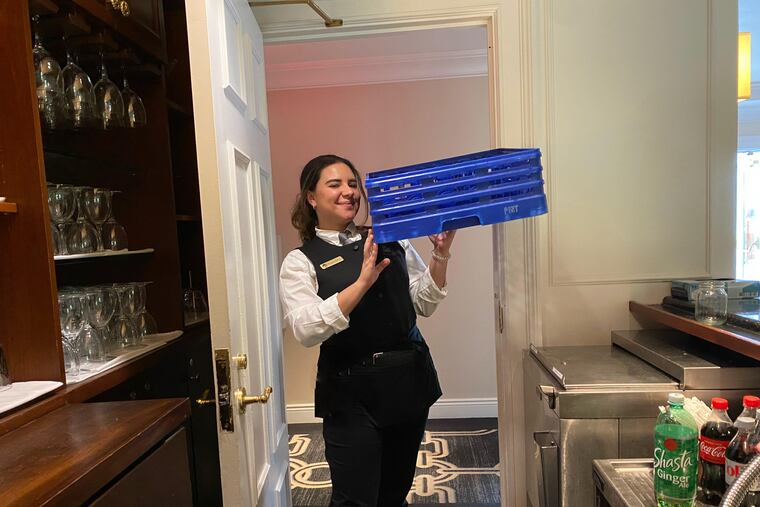Your meal is taking a long time because my restaurant has 80% fewer staffers | Opinion
A restaurant server on the front lines asks for grace from impatient customers.

Turning the corner onto the packed patio, I plaster my smile back on. With a full tray over my shoulder, weaving between tightly packed tables, I’m getting through Sunday’s double shift.
Sweat drenches me and the three other employees an hour into dinner service. There’s no hostess. No server assistant. Just two veteran servers, one manager-turned-server, and one bartender.
The 85 diners expect the same level of service they received last year when we had a full staff of 20. They sit blissfully unaware of the employees buzzing around them, as I am staggering through hour nine of 14 in a string of back-to-back double shifts and dreaded “clopens” (when you open in the morning after closing the night before).
With sore ankles and tired cheekbones, I go over to the two elderly couples seated at Table 7 with two cups of decaf coffee. One of the women (who’s been pointedly sighing all night) abruptly interrupts my dessert recommendations and squawks:
“I need this coffee fresh. I need it decaf. And I need it hot.”
Grabbing her piping hot mug, I mumble, with a mixture of shock and fatigue, “Yes, ma’am, so sorry about that,” and head to the back to brew a fresh pot of decaf myself.
All servers can tell a story like this one, especially now. All over the country, politicians, activists, and armchair economists argue over the cause of the service-industry labor shortage. Some claim unemployment benefits make for a lazy working class, while others argue the proletariat can now fight for an appropriate wage.
» READ MORE: ‘This is a real job’: Philly’s restaurant workers dissect the labor shortage, and contemplate a different future
Regardless of the cause, the reality is that Philadelphia-area restaurants face a serious lack of employees. According to the Bureau of Labor Statistics, job openings in the food-service industry outnumber the unemployed. At my restaurant, there have been three job fairs and a serious online marketing campaign in the last two months. How many applicants did they draw? Zero. Zilch. None.
Restaurant-goers notice a decline in the quality of their service. Servers struggle to keep up with the unchanged demand in the changed work environment.
So should you stop going to the mom-and-pop eatery for chicken piccata every Sunday? No! Restaurants need the revenue if there’s ever a chance of recruiting more staff to restore former standards of service. If anything, you should go out to eat more often.
Think of dining at restaurants in this imperfect post-COVID era as an investment. If you stay away, service will quickly deteriorate as loss of income quickly translates to a smaller staff. Then what should you do? Reframe your expectations.
In the new context of a short-staffed restaurant, responsible diners will show compassion for the people they’re interacting with. In general, diners should always treat the people serving them with respect and decency, but especially now when those servers are burnt out.
Paying customers should still look forward to accurate orders and friendliness. Continue to be upfront when service is not what you want it to be — let us know if the chef undercooked your steak or we forgot the side of lemons for your water. Just wait an extra few minutes to let us know, wait to see if we are going to come check on you, and please be kind in the way you ask. Give us grace.
Last week during another four-person-staffed-Sunday, I was waved over by a couple whose salmons were taking a long time to come out. Ready to be chastised, I scurried over. The woman said:
“You’re doing great, Valentina. Things are clearly a little crazy out here, so we don’t mind the wait.”
I let out a breath I didn’t know I was holding. It was an act of kindness and grace at a time when I needed it most.
When going to a restaurant in 2021, you enter an ecosystem currently thrown out of equilibrium. When you’re frustrated that your side of butter takes an extra few minutes, just bear with us.
Expectations change our experience, and so if you are ready to wait an extra 10 minutes for your salad course, it will be better for everyone. Patience, a smile, or a kind word during what’s bound to be a strenuous shift will help your server and your service.
Valentina Spadea is a junior at the University of Pennsylvania. She grew up in Lower Merion and serves and tends bar in a members-only country club on the Main Line.